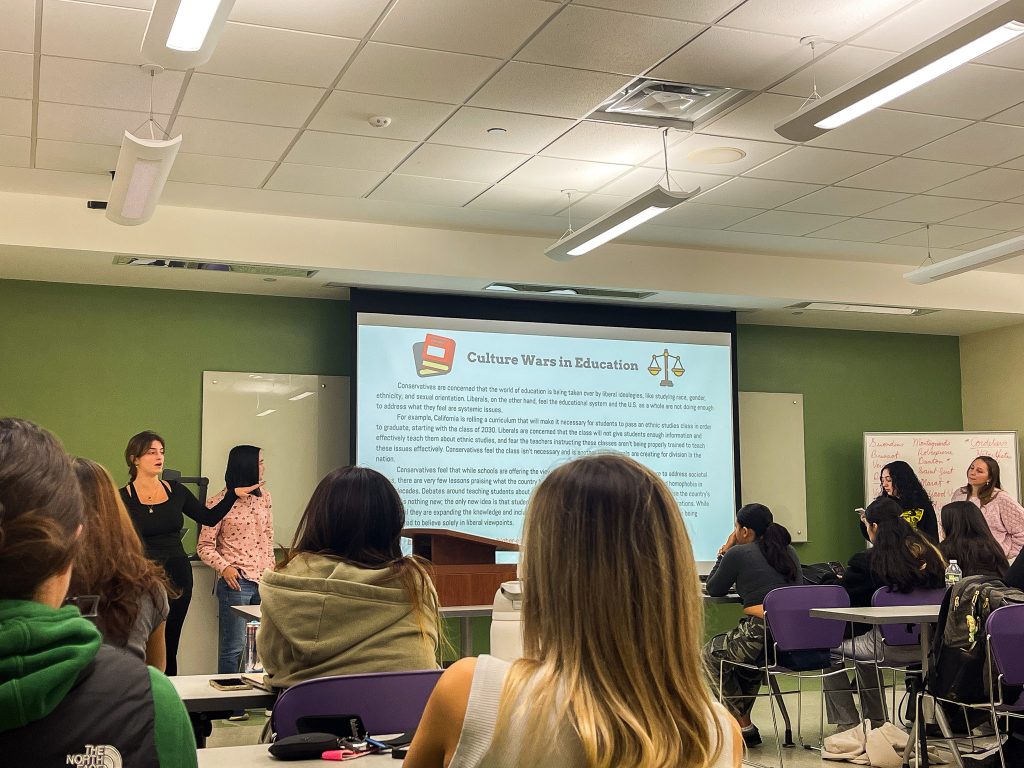On Tuesday, the education minor and the Thurgood Marshall Pre-Law Society (TMPS) collaborated to host a Culture Wars in Education Bearchat event.
Students gathered in the Binghamton University Union for a discussion on political divisions over issues currently facing Americans. The interactive event educated attendees on identity-focused issues like race, gender and sexuality. Event speakers expanded on differences between traditionally liberal and conservative values, and students from TMPS cited specific legislation, including Florida’s colloquially-termed “Don’t Say Gay” bill, which expanded on relevant political differences.
Alexis Yang, a member of the Education Minor Steering Committee’s Diversity, Education and Inclusion and LGBTQ+ subcommittees and a senior majoring in English, described the impact of topics like race and gender on students aspiring to work in education.
“As future educators, we have a responsibility to contribute to a more just, equitable and inclusive society,” Yang wrote in an email. “It is important to understand how theories such as critical race theory (CRT) work, in order to approach these social and cultural issues in the classroom. Understanding many different viewpoints will help future educators become more informed and critical learners — and thus more informed and critical educators.”
When brainstorming the topic for this semester’s Bearchat, Yang said that she wanted to address recent political developments, including the results of major recent Supreme Court decisions — 303 Creative LLC v. Elenis, Students for Fair Admissions, Inc. v. President and Fellows of Harvard College and Students for Fair Admissions, Inc. v. President and Fellows of University of North Carolina — which delivered a “massive blow” to minority communities across the country. Yang emphasized the need for students to be informed about political decisions impacting the future of the United States and its education system.
Zoey Kmack, TMPS’s treasurer and a senior majoring in philosophy, politics and law, expanded on the benefits of culture wars discussion for pre-law students.
“The inspiration for this event was to bring in a multicultural and legal perspective of history to the mainstream realm of education,” Kmack wrote in an email. “By having a well-rounded knowledge on the systematic oppression that is present in [United States] school systems, students looking to go into a law-oriented field can better understand how to approach issues involving social justice and human rights in their future careers.”
After an information session that addressed the legal ramifications of political culture wars in education, attendees considered questions in smaller groups. After, the larger group convened and participants shared their thoughts. Certain questions, like whether or not state governments should have the right to restrict discussions of identity for K-5 public schools, prompted more debate. Others, like the extent to which textbook material should be restricted, lead to less discussion.
David Archer, the education minor’s faculty advisor, said that many people hear about “uncomfortable” situations in education, related to CRT and LGBTQ+ issues.
“[Many state] legislatures getting more involved in these topics … has only made the situation more volatile,” Archer wrote in an email. “I am hopeful that learning more about these situations will enlighten them as to how to teach about them and how to act [or] react to situations they make encounter.”
Amanda Salerni, a sophomore majoring in mathematical sciences, added that the event helped to highlight how politics impacts identity.
“In our discussions it was nice to not only think about how to look at these different issues, but also to hear others’ perspectives on them,” Salerni wrote. “These different perspectives are key to proper education in the future, especially since most schools in the [United States] are public schools, where there are different ethnicities, [religions], political views and genders.”
Editor’s Note (10/26): Alexis Yang is the current arts and culture editor at Pipe Dream.



